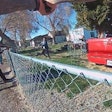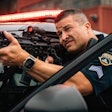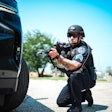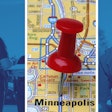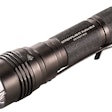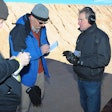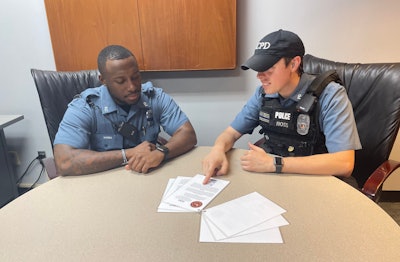 Officer Blake Ross, a field training officer for the Kansas City Police Department, coaches Officer Michael Words, left, on some of the techniques of the Tactical Longevity program.PHOTO: Kansas City Police Department
Officer Blake Ross, a field training officer for the Kansas City Police Department, coaches Officer Michael Words, left, on some of the techniques of the Tactical Longevity program.PHOTO: Kansas City Police Department
In Kansas City, MO, police are working closely with a psychologist to address the mental well being of officers in advance of stress or issues arising. Rather than being reactive, the department’s Tactical Longevity program strives to be preventative.
The concept was developed out of Jennifer Prohaska, Ph.D., realizing she could never help all the PTSD cases that could develop unless she could get in front of the challenge in advance. She saw the need to create some preventative measures and the key to the success of the Tactical Longevity program is to develop resilient officers.
“If you have strong resiliency, you can prevent post-traumatic stress disorder,” she says.
Prohaska is a clinical psychologist who has mostly been focused on neuropsychology and in 2013 she began working with law enforcement agencies. As part of a private firm back then, she assisted about 30 agencies across Kansas, Missouri, and Nebraska. She launched her own practice in 2016, expanded, and found herself working with about 54 agencies as a consultant. But she has a special relationship with the Kansas City Police Department.
“KCPD is the agency that I have that's not only the largest, but also has the most violence and the most exposure to really traumatic events,” she says. “So, when I had this idea for this project, I approached them.”
In February, the first pilot group of officers began learning Tactical Longevity. It is first taught to the field training officers (FTOs) who in turn teach and coach each batch of new recruits.
“We want to make sure that we can validate our programming and make sure that we are showing this increases their longevity, this increases their ability to stay healthy as officers,” she says. “We're basically trying to meet all the needs that our board of police commissioners is asking for — how do you have great community relations, officer health and wellness, and then also retention?”
So, what is a resilient officer and why does it matter?
“A resilient officer is someone who can bounce back from a really difficult experience, someone who can both not only mentally but also physically bounce back. We've spent energy and effort on physical resiliency, but we really do need to spend effort on emotional and mental resiliency,” Prohaska says. “Difficult things will happen. We're never going to be able to prevent that. It's more about how you bounce back from those difficult experiences.”
Prohaska’s partner in the project is Sgt. Phil DiMartino, a night-shift patrol sergeant and former FTO who now trains the department’s FTOs. He see’s this program as a way to not only help prepare individual officers but also improve the whole department.
“We’re also looking at the resilient component to create that cultural shift in the agency. So, we want this to become a cultural norm that we feel inside the four walls of the PD, but it also radiates out into the community,” says DiMartino.
Currently the department has about 1,300 officers, but when fully staffed that number grows to 1,500. DiMartino, a 13-year veteran of the department who has worked in what he calls the inner city, says recently officers were faced with three deceased bodies in one week. He wants officers to be trained and prepared to cope with what they see and encounter on the streets and he plans to use Tactical Longevity to develop those skills early in their careers.
“So, the volume and the intensity, it’s really fast. It accumulates quickly especially when we have our newer, younger officers. They get exposed to a lot really fast,” DiMartino says. “We need to equip them with the tools. We can do this long term, and not just for the sake of the PD. I want these guys to be healthy at home. Because honestly, the PD is one thing, but their livelihood outside of here that's what matters. That's what really matters.”
Prohaska says cultural change in a police department must come from the ground up as opposed to from command down. That is why KCPD launched Tactical Longevity with the department’s newest officers by way of the FTOs. Soon, all frontline sergeants will be trained on teaching resiliency as well.
“It is hard to teach an old dog new tricks. Cultural shifts and changes take a few years, but we're doing a full court press on that from the bottom up,” Prohaska says.
DiMartino says teaching officer resilience to the new officers will be standard, same as they are taught everything else they need on the streets.
“So, just like I'm teaching the recruit officer safety — where to stand, blade your gun-side away, watch hands in the pockets — we're teaching resiliency in the moment, just like officer safety or learning to talk on the radio,” DiMartino explains.
Tactical Longevity is built upon six resilience elements, all which Prohaska says can deteriorate under high intensity prolonged stress and high trauma experience if an officer is not prepared.
VALUES
Values provide the ability to utilize what is most important to you when deciding how to act in any given situation and focus on what is important to you when overcoming challenges.
“When people get into this career, what can happen with their values is if you don't act in line with your values, or if you're in a situation where you're forced to act out of line with your values, it can make you depressed and it can make you really get burnout pretty fast,” says Prohaska.
The training brings awareness to the officers that they have values and teaches them to focus on when those values show up in their work environment and not the times when they do not show up. She used DiMartino as an example to explain. She pointed out the sergeant has shared his values include the importance of being seen as fair and also demonstrating love and connection with other people.
“When he reaches times in his career where that's not exactly how he feels about the work he's doing, he's got to rely on ‘I know my value is integrity or fairness,’ and here's a time when I've seen it or here's a time in that bad situation when integrity and fairness showed up,” Prohaska says. Then the next step is for him to direct his mindset and mental energy to the things that do align with his values, not necessarily things that do not.
SELF-AWARENESS
Self-awareness is the ability to utilize what is most important to you when deciding how to act in any given situation and focus on what is important to you when overcoming challenges.
Prohaska says one of the things that happens with people in really high stress conditions is they start to lose some of their self-awareness. High stress conditions make people take their focus outward, not inward.
“We need self-aware officers so that they know how to control themselves when the situation around them is rapidly evolving. So, we teach self-awareness through some exercises through the FTOs,” she says.
Self-awareness is particularly important under high stress and Prohaska points out some situations could immediately call for responding at an 8, on a scale of 1 to 10, but post situation the officer may need to quickly dial back to a 4.
“If you're not self-aware of what you're thinking and feeling, it's really hard to dial it back and forth to the situation in front of you,” she explains.
SELF-REGULATION
The ability to change or manage one’s thoughts, emotions, behaviors, or physiology for the purpose of achieving a desired outcome is what Tactical Longevity calls self-regulation.
Prohaska explains this is the ability to calm yourself down or conversely get more amped up depending on which response is needed.
“Attuning to the situation in front of you, that self-regulation is so important especially being able to calm down,” she says.
DiMartino sees how this directly relates to the new cops on the streets.
“Working in the city there are a lot of crime scenes and a lot of large-scale crime scenes are super intense for a very short burst. You'll realize very quickly, man, this is hard to come down from, ‘Why am I still amped up?’” says DiMartino. “So, one of the techniques we're using is, ‘Hey, take a walk with me.’ We might walk the perimeter of the crime scene, and then we'll come back to where we refocus, we're back dialed in.”
The sergeant says an FTO will watch for these times when a recruit needs help coming back down and intervene, simply by taking that walk together. The tactic helps get the new officer regulated fast and back in the game. Prohaska says the program teaches breathing techniques and progressive muscle relaxation as well to help an officer dial back down while still working.
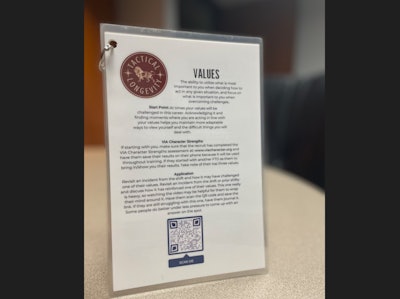 Field training officers are provided Tactical Longevity reference materials to keep with them while working with new officers.PHOTO: Kansas City Police Department
Field training officers are provided Tactical Longevity reference materials to keep with them while working with new officers.PHOTO: Kansas City Police Department
MENTAL FLEXIBILITY
Mental flexibility is the ability to look at situations from multiple perspectives, shift one’s thoughts or actions when presented with new information, and respond to unexpected change easily.
“Sometimes when we're under high stress conditions, we can get really rigid, and we can only think my way or the highway. That is not what modern day policing is asking for,” Prohaska says. “So high flexibility officers are ones that can do that dialing in and back and also take the perspective of another person.”
She says FTOs will often take time to talk to new officers following a call to ask how they think they responded and how they think the other individual received what the officer had to say in handling the situation. Those times become teaching moments.
“It's a good reminder that, especially with our recruits, they're meeting people and probably at their worst time. So, it's important to remind that recruit that reaction was not about them. You have to think where that person is coming from. This person may not have a positive history with law enforcement, that's not against you and also it's an opportunity to change it,” says DiMartino.
CONNECTION
Connection is the ability to build and maintain strong, trusting relationships.
Prohaska says they are finding officers are coming into field training with less social connection skills than new officers had in the past. It is a generational change in the workforce, and she says it as a product of society and technology progression.
“So, we're having to spend extra effort and energy on telling them about the importance of knowing your colleagues really well. When we really break it down, one of the most preventative factors against traumatic stress development is the strength of your social connections. The people who have the strongest social connections tend to have the best resiliency ability to bounce back from trauma,” Prohaska says.
The FTOs are issued conversation cards, which they keep in their patrol unit. When there is downtime between calls, the FTO can use those cards as conversation starters on a variety of topics from fun to serious. It teaches the new officer to relax and engage in conversation and build a connection.
Building those connections is crucial and go a long way towards officer retention, explains DiMartino.
“When these guys are going through these stressful times and it's just one hit after the other, they're telling us they're staying in the business because of their teammates, because of the bonds they've made on the PD with their guys,” he says. “That's why they're staying in it. We’ve really got to hit home these connections.”
ACCURACY
Accuracy is the ability to fairly assess the situation at hand, focus on what you can control, and take intentional action in the direction of what you can control.
“Accuracy is basically looking at a situation and not overly skewing it negative. So that's a big part of what we focus on is when you look at a situation and you automatically assume the worst,” explains Prohaska. “So, we're trying to aim for accurate thought, not necessarily optimistic.”
She explains how this works to officers using the example of responding to a domestic violence call. An officer can be pessimistic and feel like the situation never changes and they will respond to the same address again and again. Prohaska says the feelings that develop with that attitude will be frustration, anger, and disillusionment with society. Under the Tactical Longevity approach, those are not accurate thoughts. The better approach is to think “I controlled what I could control. I kept this male or female safe for the evening. They make choices after this. But right now, I did my job.”
GOING FORWARD
Already, the FTOs have taught about 50 recruits and another 18 are slated to start the training next month.
“The way our agency works is recruits gain tenure very quickly because we send in new people behind them. So, as they gain their tenure, their base is built on this Tactical Longevity program. Then that's also part of that cultural shift that we talked about earlier,” says DiMartino.
To maintain the program and thought processes with officers after completing the 10 weeks of field training, all frontline supervisors will be trained in the Tactical Longevity program. Earlier, the program was presented to all members of the department of the rank of captain and above so they would have knowledge of the goals and implementation.
The pilot program was about a five-hour segment in FTO school with those trained FTOs then teaching the new recruits while in the field. Soon videos will be produced and released to the FTOs and recruits to reinforce the training and a related app also is in the works. The feedback from Tactical Longevity so far has been good.
“We're hitting the ground with this and I can give you some early reports from some of our guys who've already used it. There's a lot of positive feedback, even from my most recent recruits in FTO assignment I had in my squad. These guys were using these exercises almost daily, definitely weekly, and the feedback was instant,” reports DiMartino.










